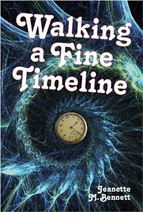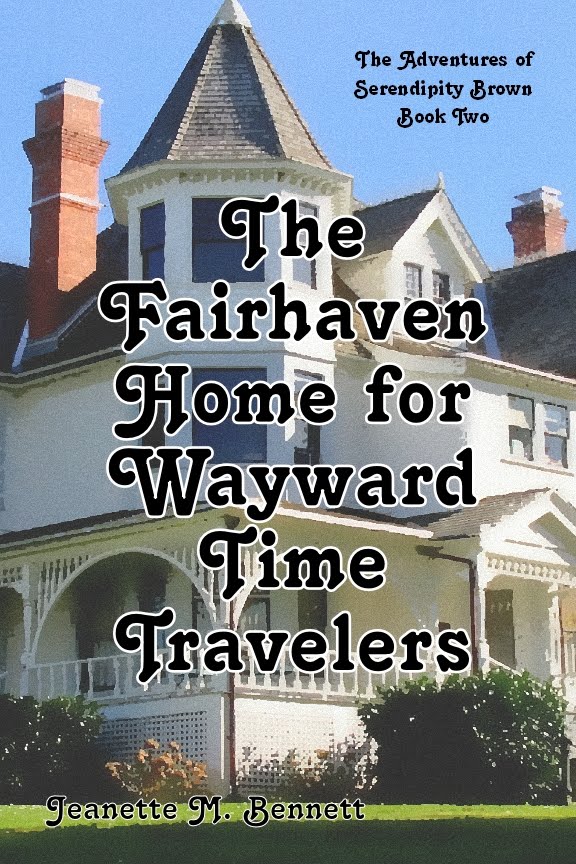 Today I was lucky enough to get a short meeting with one of my favorite poets, Elizabeth Barrett.
Today I was lucky enough to get a short meeting with one of my favorite poets, Elizabeth Barrett. I had to disguise myself so she won’t recognize me when we next meet and I interview her ten years from now. (Twenty-six years ago for me.) I doubt she will remember me, for I don’t have a memorable face. Still I put talc in my mustache and hair so I would look older. Of course I was 26 years younger then, so I suppose already look older. I decided it was best to be on the safe side.
I had hoped Elizabeth would go to church with her family, but no luck. Her father, Edward Barrett, is a very domineering man who would disinherit any child who dared to get married and leave home. Elizabeth is the oldest of twelve children, eleven of them actually reaching adulthood.
I waited outside their residence at 50 Wimpole Street here in London. Unfortunately when the family came out, Elizabeth did not appear to be among them. I knew she seems to be having health problems now. I suppose she decided not to come accompany the family to church.
I decided to try a more daring ploy. I went up and knocked on the door. A servant answered and I asked if I could get Miss Barrett to sign her book of poems for me. It was to be a present to my wife. I didn’t mention she was imaginary.
The servant frowned, but took my book and shut the door leaving me on the stoop. A few minutes later he reappeared and said that Miss Barrett would give me a couple of minutes. I thought the “present for my wife” might arouse the curiosity of a romantic!
I was led upstairs. A woman met me at the door. “I’m Miss Wilson, the nurse. You will only stay a few minutes. Miss Barrett is not well.”
I came into the room, while the nurse watched me carefully. Miss Barrett was sitting in a chair with a blanket throw over her legs. A cocker spaniel laying on the floor beside her raised it’s head and growled.
“Shhh, Flush! It’s all right,” Miss Barrett reprimanded the beast.
The gold haired dog snorted and plopped it’s head back down.
I held out me hand to Elizabeth, careful to leave my gloves on. It’s not proper for a gentleman to touch a lady with his bare hands. “Hello, Miss Barrett. My name is Professor Howe. I really must thank you for this honor.”
Elizabeth gives me a weak smile. “To be honest, the life of an invalid can get a little tedious. If it wasn’t for my poetry and Flush, I don’t know what I would do.”
“Would it be too forward of me to ask what your malady is, Madame?”
Elizabeth shrugs. “I wish I could tell you, sir. I first fell ill when I was twenty, about the time my mother died. The doctors don’t know what it is, but they have me on medicine.”
I noticed a sicky sweet smell in the room--Opium: the Victorian “wonder drug”. Physicians are too generous with it. One can buy it at any Chemist Shop cheap. It’s excellent pain killer. It’s also highly addictive. This could well be part of her problem. Blasted quack doctors!
“My health seems to have declined even more since…since…” Elizabeth looks over at an etching of a young man by her bedstead.
“I’m so sorry. Was he a fiancee?”
“My brother, Edward. Five years ago the doctors insisted I get out of London and get some fresh sea air. I went to Torquay, my brother Edward offered to go with me, to watch out for me. Father wasn’t happy, but he allowed it. Edward and I had a lovely time. Then three years ago, Edward died in a sailing accident.” Tears welled in her eyes. “He was only there because of me.”
“You can hardly blame yourself, Miss Barrett. It was not you fault.”
“Yes, it was. I was the one that wanted Edward there with me. It was all my idea.”
Opium and depression. No wonder she has locked herself in her room.
“I’m sure if you had never asked your brother, he would have insisted on going. It’s a brother’s duty to watch out for his sisters. I would have done the same.” I don’t tell her I am an only child.
I pull out a copy of The Seraphim and Other Poems. “Would it be too much to ask you to autograph your book for me?”
“Yes. You said it was a present for your wife? Birthday?”
“No, wedding anniversary. Mary and I will be married twenty-six years next Tuesday. I thought she might like a book of your poems. She so enjoyed your poem “The Cry of the Children” condemning child labour.” I don’t add what social impact that poem will have, helping bring about reform.
Elizabeth takes the book and opens it. The nurse brings over a pen and inkwell for her. Elizabeth signs the book, then holds it to let the ink dry. “I take it you love your wife, Professor Howe?”
I would if I had one. “Yes! I love Mary to the depths of my soul.”
Elizabeth looks thoughtful. “Depths of my soul?…Breadth?…Height?…Hmmm?”
Ooops. I quickly change the subject. “Erm, yes! Mary is quite the woman. She’s put up with an absent-minded professor all these years.”
“It must be nice,” Elizabeth large dark eyes were wistful. “Having someone to love. It’s something I will never have.”
“Now, now, Miss Barrett. I’m sure your Prince Charming will show up any day.”
“Sir, I’m not a child. I’m thirty-seven years old. I’m an old maid and an invalid. What man would want me?”
“Perhaps some dashing young man might read your poems and fall in love with the inner you…the real you.”
Elizabeth actually smiled at that. “My dear Mr. Howe, you are a romantic! And they say poets have flights of fancy!” She hands me back my book.
I decide I better get out of there before I say too much. “I do not wish to fatigue you too much. I cannot thank you enough, Miss Barrett. This will mean the world to Mary.” I give her a slight bow. “It was indeed an honor to meet you.”
“It was nice to meet you, too. It’s nice to meet someone who still believes in fairy tales.”
 I wish I could tell her that she will soon be the princess in a real life fairy tale. Next year she will publish another book of poems, and another poet will read them and fall in love. In three years time, the dashing Robert Browning, six years her junior, will whisk her away to Italy where they will live happily ever after.
I wish I could tell her that she will soon be the princess in a real life fairy tale. Next year she will publish another book of poems, and another poet will read them and fall in love. In three years time, the dashing Robert Browning, six years her junior, will whisk her away to Italy where they will live happily ever after. Well, happily enough until Elizabeth dies at fifty-five. At least the dear lady will have fifteen years of happiness. I remember how the Brownings will look at each other some day.
How can I tell her that she inspires me, that it’s never too late to find love that lasts forever?
I can’t even tell her to never give up hope, that I know love will find her. The Institute of Time Travel would have my license for breaking the rules. So I just give her a sphinx-like smile. “May you find another soul as vast as your own, Miss Barrett.”
***************************
Elizabeth Barrett’s love poem to Robert Browning:
How do I love thee?





